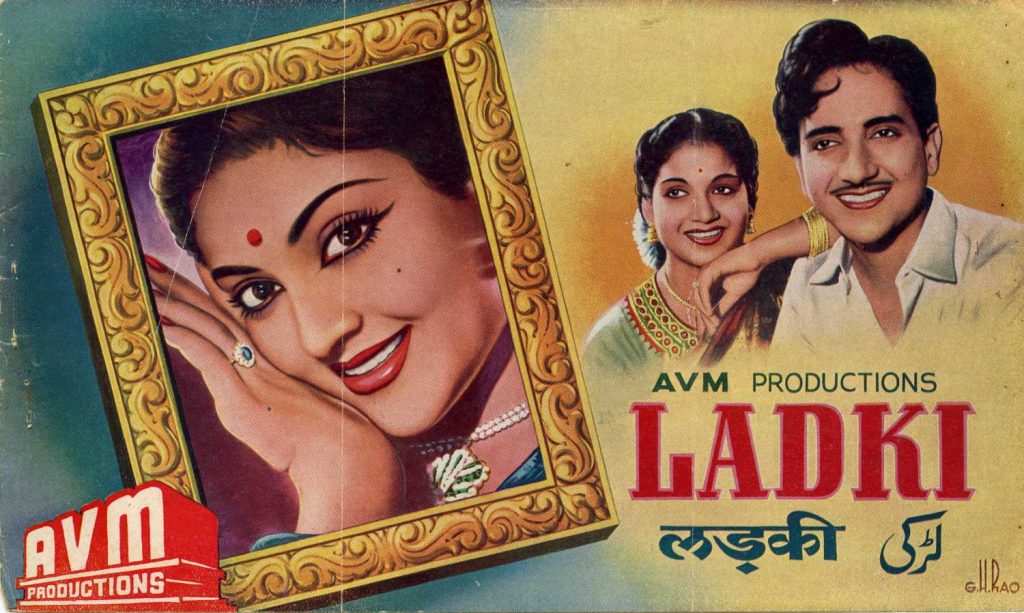On viewing a film like Ladki now, you cannot help but wonder…What were they thinking?! A ridiculous excuse of a plot having a ‘social message’ on caste presented with so-called ‘entertainment’ – arbitrary items strung together with comedy, romance and tragedy in turns – with some ‘feminism’ thrown in for good measure as well!
So, we have Rani (Vyjayanthimala), a feminist who believes in equal treatment of women and who is best friends with Kamini (Anjali Devi), much to the disapproval of her mother since Kamini’s father (Chittor V Nagaiah) had married a woman of a low caste. Kamini and Rani meet Raja (Bharat Bhushan), a medical student, and Kishore (Kishore Kumar). Raja and Kamini fall in love while Kishore likes Rani. Rani goes to Colombo for the University Sports Tournament and while winning every single event she enters there, injures her leg and is in hospital. Meanwhile, Kamini and Raja marry secretly since he knows his woman-hating, upper caste father will never agree to this marriage. Captain Sundar, Kamini’s childhood friend, comes from Rangoon and wants to marry Kamini but is shattered as he finds out she is married to Raja. Raja’s parents are told of the wedding and they call him home, asking him to forget the marriage and marry a girl of their choice. Raja refuses and goes back to Kamini and misunderstands the situation when he sees Kamini with Sundar. He returns to his parents and tells them he’s willing to marry the girl of their liking, who turns out to be Rani, having returned from Colombo…
There is not much to say about the superficial handling of the film’s content that talks about respecting women and looking at human beings not by their caste but by their deeds. Much of the message is lost and diluted in the film’s desperate aim to entertain by sugarcoating its issues. What’s more, the clunky overlong film has dated and dated badly. Some of the sequences like Kamini’s father’s death are absurd to say the least. The ‘obvious’ metaphors like the model of the house exploding to show Kamini’s state of mind when Raja says he has cut off all ties with her are unintentionally funny, while the less said about Om Prakash’s woman-hating comedy track, the better.
Ladki re-unites Vyjayanthimala with her Bahar (1951) director, MV Raman, and producer from the South, AV Meiyappan. As with Bahar and many of her early films, it is Vyjayanthimala’s dances that are the film’s saving graces although it is unintentionally finny now to see how deliberate and obviously tacky the scenes are which lead into her dances. For instance, a foreign dancer in Columbo does her dance and then it is asked of the audience if anyone will challenge her. Of course, we know Vyjayanthimala will! And lo, we not only have a song and dance with complete costumes and amicably designed sets with Vyjayanthimala mouthing the wonders of India but during the course of the song, we have two Vyjayanthimalas dancing simultaneously, one playing a male role! Of course, the foreign dancer beats a hasty retreat. And if that is not enough, we have another song using this device of a male and female Vyjayanthimala right throughout and often simultaneously within the same frame, logic be damned. One supposes that these were regarded as highly imaginative items in their time.
Looking at the central performances of Vyjayanthimla and Anjali Devi – as in Bahar with Vyjayanthimala and Pandari Bai, Ladki, too, makes no real demands on ‘feminist’ tomboy Vyjayanthimala histrionically and leaves the other actress, Anjali Devi, to play the so-called acting role, in this case the weepy, motherless girl who suffers because her father did not believe in caste differences and married a woman of low caste. South Indian films do have a tendency to be melodramatic but here it must be said that, by and large, Anjali Devi acquits herself rather well as against Pandari Bai’s eye-popping theatrics in Bahar. The heroes, Bharat Bhushan and Kishore Kumar, are strictly supportive appendages at best and Bhushan looks woefully out of sorts and uncomfortable on screen while Kishore Kumar does what he can, bringing the film to life with his lively antics whenever he is on screen. One sees his potential for zany comedy that would go on to flower fully in films like Asha (1957), Chalti ka Naam Gadi (1958) and Half Ticket (1962). Chittor V Nagaiah lends solid support as Kamini’s father.
The music of the film by Dhaniram and R Sudarshanam is melodious and sweet enough, the stand out number being Geeta Dutt’s semi-classical Baat Chalat. Those who think the singer had a limited range and a lack of training to sing truly complex songs would have to do a strong rethink after hearing her amazing rendering of the song. Kishore Kumar too makes an impact with his fun solo – Shaadi…Shaadi.
The film also has a Tamil version, Penn (1954), with both Vyjayanthimala and Anjali Devi playing the heroines and Gemini Ganesan and S Balachander taking on the Bharat Bhushan and Kishore Kumar roles respectively and a Telugu version, Sangham (1954), with again the same two actresses and NT Rama Rao and S Balachander doing the male lead roles. Also, Shaadi finds its Tamil counterpart in Kalyanam, sung brilliantly by comedian Chandrababu for Balachander.
All in all, Ladki makes for extremely tedious viewing today.
Hindi, Drama, Black & White


